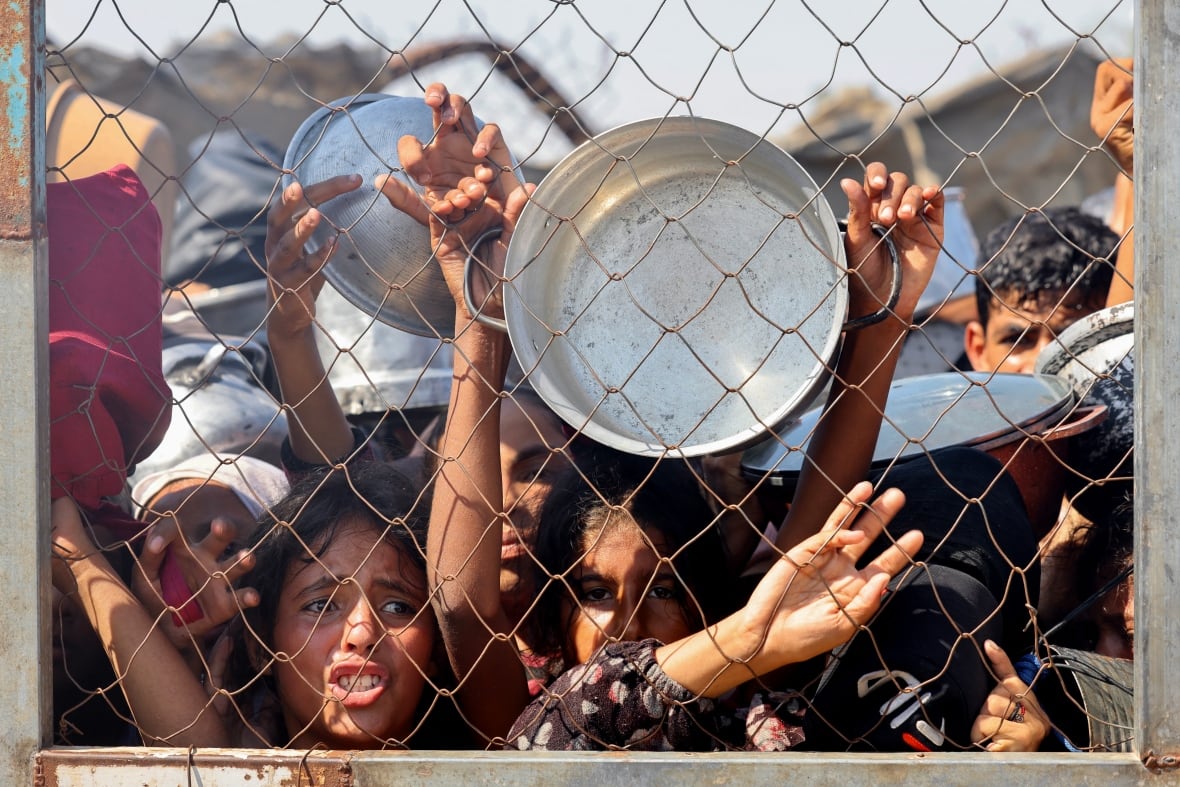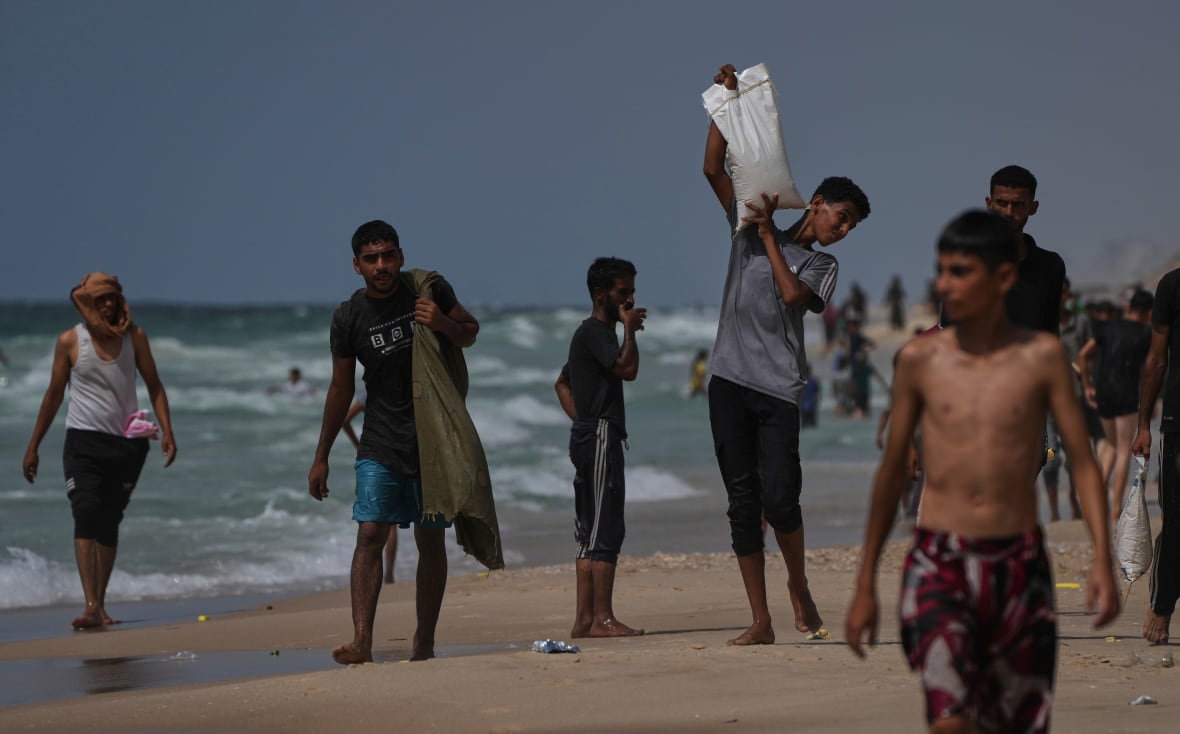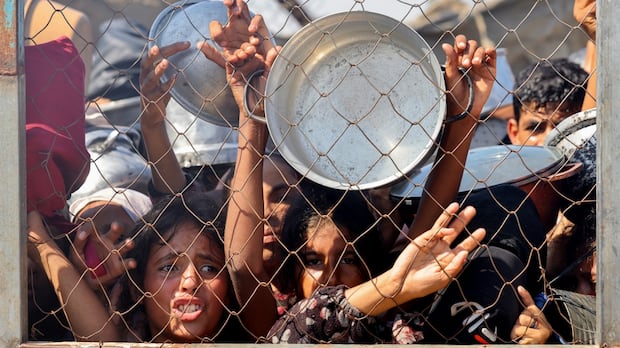
In what humanitarians are calling a make-or-break week for saving Palestinians from famine, Donald Trump’s “I see it” moment may be a tipping point.
Humanitarian organizations have for months warned that Israel’s restrictions on the flow of aid were bringing Gaza to the brink of famine. The latest warning from a UN-backed hunger monitor said Tuesday that famine was now unfolding across the enclave.
Yet as recently as last weekend, Israeli Prime Minister Benjamin Netanyahu bluntly stated “there is no starvation in Gaza.” He accuses Hamas of stealing available aid.
Trump himself seemed indifferent until Monday when, while in Scotland, he publicly disagreed with Netanyahu, saying he’d seen the images of starving children.
“That’s real starvation,” he said.
“I see it — and you can’t fake that.”
With the conflict in Gaza at a stalemate — and the civilian population paying an increasingly steeper price, including the Israeli hostages still in Hamas’s hands — what Israel’s allies, especially Trump, do or say is key to bringing the bloodshed to an end.

The growing chorus of calls this past week, sharpened by voices from G7 countries including Canada, for Israel to open the crossings into Gaza had already started to lead to change on the ground.
Israel, which had insisted on its own controversial means of distributing aid, was forced at least to resume air drops and to slightly ease the movement of aid trucks into Gaza. It also paused the fighting in three areas daily to allow the flow of aid.
Trump’s public acknowledgement gave an urgency to those calls that could only come from Israel’s staunchest ally, and which could help nudge Netanyahu to do more to ease Gaza’s humanitarian crisis.
Within hours, Netanyahu’s office had issued a statement that Israel would continue to work with international agencies and other countries to “ensure large flows of aid” into Gaza.
More West Bank settlements
How Trump plans to persuade Netanyahu to pursue what the president described as “a different way” to bring home the 50 Israeli hostages remaining in Gaza is going to be much harder.
Trump was keen on making a deal that would see all the hostages released, and Israel’s attacks on Gaza ended. But the U.S. and Israel withdrew their teams from the latest talks in Rome, accusing Hamas of negotiating in bad faith.
Israel’s attacks on the Gaza Strip have sent the territory into a hunger crisis, and now a UN-backed food crisis authority says the situation is reaching famine levels. According to the Integrated Food Security Phase Classification platform, two out of three famine thresholds have been reached in Gaza: plummeting food consumption and acute malnutrition.
Those familiar with the talks suggest one of the biggest obstacles to a lasting ceasefire is that Hamas wants a permanent one, while Israel refuses to leave Gaza with Hamas still in charge.
Another is Netanyahu’s opposition to a two-state solution. Settlements have multiplied in the West Bank under Netanyahu, and in a non-binding vote in the Israeli Knesset last week a majority called for the annexation of the West Bank altogether.
It is why Israel’s closest Western allies have recently reaffirmed their support for a two-state solution — also a longtime cornerstone of Canada’s Mideast policy — with some promising to recognize a Palestinian state this fall.
France announced last week it intends to recognize such a state at the UN General Assembly in September.
Under pressure from within his own government, U.K. Prime Minister Keir Starmer on Tuesday also said he would recognize a Palestinian state in September — unless Israel agrees to a ceasefire, takes steps to make clear there is to be “no annexation of the West Bank, and commits to a long-term peace process that delivers a two-state solution.”
The U.S. is far from doing the same. But if other Western allies, maybe even Canada, join the chorus (147 other countries already recognize a Palestinian state) Trump may be forced to at least acknowledge the shift.
Canada’s Department of Foreign Affairs did not immediately respond to the latest developments.
Netanyahu condemned France’s declaration and is likely to receive the British decision similarly, arguing that they “reward terror,” in the wake of Hamas’s killing of about 1,200 people on Oct. 7, 2023, and abducting 250 others.
But Britain preempted such accusations and again called on Hamas to release the 50 remaining hostages.
“Hamas are not the Palestinian people, and there is no contradiction between support for Israel’s security and support for Palestinian statehood,” said British Foreign Secretary David Lammy.
Possible sanctions
Some critics however are skeptical that such declarations will do anything to meaningfully move the needle on solving either the immediate or the larger conflict.
Such gestures alone are “not going to do any lasting change to Israeli behaviour,” said Michael Lynk, a former UN special rapporteur on the human rights situation in the Palestinian Territories.

“Countries in the global north are going to have to take a significant step forward by looking at sanctions on Israel in order to make any lasting progress on achieving a Palestinian state.”
France, Canada and the U.K. signed a joint statement in May promising to not “stand by while the Netanyahu government pursues these egregious actions.
“If Israel does not cease the renewed military offensive and lift its restrictions on humanitarian aid, we will take further concrete actions in response.”
It was not made clear what those actions might be, but Lynk says they could include sanctions.
“Only sanctions with respect to military sales and economic relationships with Israel are likely to have any chance of changing Israel’s behavior,” he said.
Trump did not immediately comment on the British decision, but last week he belittled Emmanuel Macron’s statement.
“What he says doesn’t matter,” he said of the French president. “It’s not going to change anything.”
How this all plays out now that Starmer has added his voice may largely depend on how Trump sees it.





More Stories
Hong Kong has issued a warrant for his arrest, but this Vancouverite isn’t worried
Trump is threatening Putin with a tighter ceasefire deadline. Russia is shrugging
Fugitive ex-Olympian’s alleged cocaine courier agrees to U.S. extradition